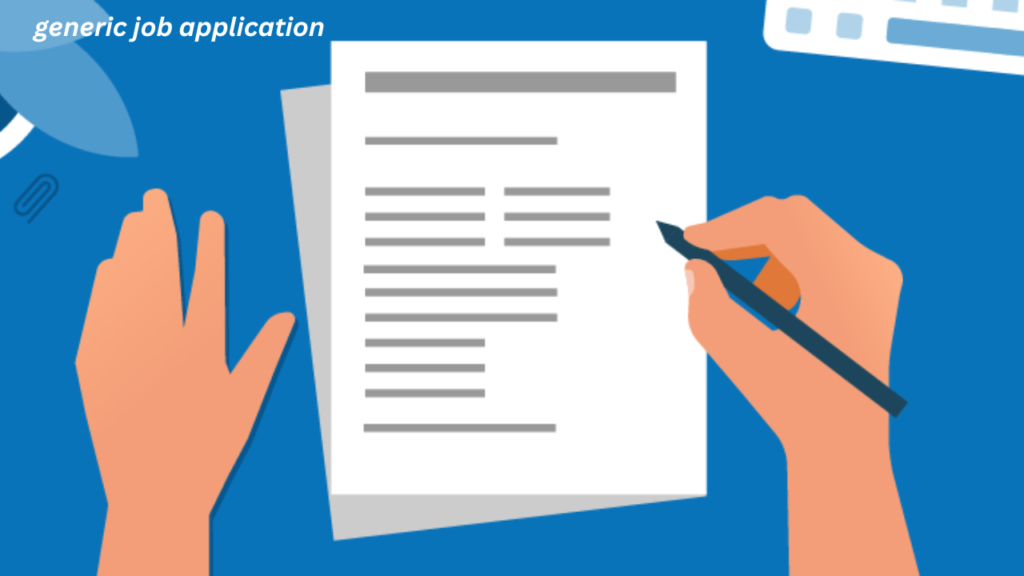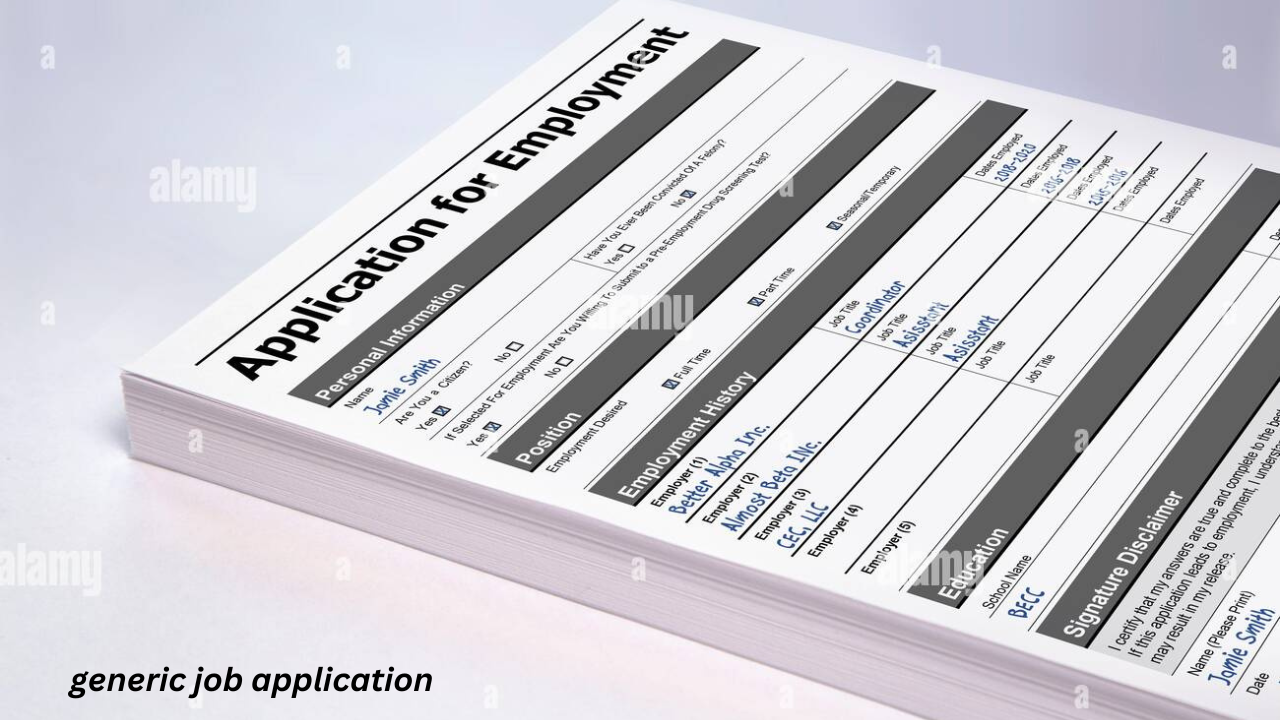In the fast-paced world of job hunting, the typical advice is often to tailor your resume and cover letter to each specific job you apply for. However, an overlooked approach that could actually save time, energy, and lead to career growth is the use of a generic job application. While it may seem counterintuitive, leveraging a generic application can open doors to various opportunities and serve as a strategic tool in your career progression.
In this article, we will explore why a generic job application can be your secret to career growth, and how it can benefit both job seekers and professionals aiming to scale up their careers.
What is a Generic Job Application?
A generic job application refers to a standardized resume and cover letter template that is not tailored for any specific job posting. Rather than customizing each application to fit the requirements of every position, you prepare a broad document highlighting your general skills, qualifications, and career experiences. This approach allows you to quickly apply for multiple job openings without having to create a new application from scratch every time.
The Benefits of Using a Generic Job Application

The traditional advice of tailoring applications can certainly increase your chances of getting hired, but it comes at a cost. Customizing every application takes time, and if you’re applying to numerous jobs each week, this process can be highly exhausting and inefficient. Here are some of the key benefits of using a generic job application:
Saves Time and Energy
Job searching can be a full-time job in itself, and constantly revising your resume and cover letter for each new job posting can quickly drain your resources. A generic job application eliminates the need to start from scratch every time you see an exciting job posting. You can submit applications more quickly and efficiently, freeing up your time to focus on other important aspects of the job search, like preparing for interviews or networking.
Increases the Volume of Applications
With a generic job application, you can apply to more positions in a shorter amount of time. This increased application volume can lead to higher chances of landing interviews and offers. The more applications you send, the greater your chances are of finding a job that matches your skill set. By applying to numerous companies at once, you increase your exposure to a variety of industries and positions.
Focuses on Core Strengths and Transferable Skills
A generic job application allows you to highlight your core strengths and transferable skills, which are relevant to a wide range of industries. Instead of focusing on specific qualifications for one job, you can emphasize your general skill set, such as leadership, communication, problem-solving, and adaptability. These traits are valuable in virtually every work environment and can appeal to hiring managers across many different fields.
Improves Your Brand Consistency
When using a generic job application, you can focus on maintaining consistency in how you present yourself across multiple job applications. This consistency ensures that all employers see a unified version of your professional identity. Having a polished, consistent resume and cover letter can help reinforce your personal brand and make you stand out as a professional.
Open Opportunities in Multiple Sectors
One of the biggest advantages of a generic job application is its ability to keep the door open for opportunities in various fields. Since your application is not tailored to a specific job, it can appeal to recruiters from a broader array of industries. Whether you’re looking to change careers or simply exploring opportunities in a new field, a generic application allows you to broaden your job search and consider positions you may not have initially thought about.
How to Create an Effective Generic Job Application
While the idea of using a generic job application is appealing, it’s important to ensure that it’s effective and compelling. A generic application doesn’t mean you should submit a poorly written or unpolished document. Here are some tips to help you create a high-quality generic job application that can boost your career growth:
Focus on a Strong Summary
Your professional summary is the first section of your resume, and it should capture the attention of hiring managers. For a generic job application, craft a well-rounded summary that highlights your most important skills and experiences. It should be versatile enough to appeal to a variety of industries but specific enough to show that you have expertise in areas that are relevant to the majority of job roles.
For example, instead of writing, “I am a marketing expert,” you could say, “Results-driven professional with expertise in project management, marketing strategy, and team leadership across diverse sectors.”
Highlight Transferable Skills
Make sure your resume focuses on transferable skills that can be applied to a wide range of job positions. Skills like problem-solving, time management, communication, leadership, and teamwork are highly valued in any job role and should take precedence on your resume. These skills will demonstrate your ability to succeed in various environments, even if you lack industry-specific experience.
Use Keywords for a Broader Reach
Incorporate industry-relevant keywords throughout your resume to ensure it gets noticed by automated Applicant Tracking Systems (ATS). These systems scan resumes for specific keywords and phrases that match the job description. By using generalized terms that are widely applicable (such as “team collaboration,” “project management,” and “client relations”), you increase your chances of getting noticed by recruiters in different sectors.
Showcase a Versatile Work History
When listing your work experience, focus on achievements and skills that can be applicable to a variety of positions. This might involve emphasizing roles that demonstrate your versatility, such as leadership positions or roles where you had to adapt to different industries or environments. Providing quantifiable accomplishments, such as “increased sales by 20%,” can showcase the impact you had in previous positions, regardless of the specific field.
Keep it Concise but Informative
Your generic job application should be both concise and informative. Avoid overwhelming recruiters with unnecessary information, but also ensure that you provide enough detail to showcase your strengths. Stick to one or two pages for your resume and keep your cover letter clear and focused on your key qualifications.
When Should You Use a Generic Job Application?
While a generic job application can be highly beneficial, it’s not always the best choice for every situation. Here are a few scenarios when using a generic application might be a smart strategy:
- When Applying to Multiple Positions: If you’re casting a wide net and applying to several positions in different fields, a generic application will allow you to quickly submit your application to a variety of companies.
- When Changing Careers: If you’re looking to transition to a new industry, a generic job application can help highlight your transferable skills and give you the flexibility to apply to a broad range of roles.
- For Entry-Level Roles: If you’re just starting your career or looking for entry-level positions, many of the skills you bring to the table are universally applicable. A generic application can highlight your adaptability and eagerness to learn.
Conclusion
In today’s job market, efficiency and volume are key when it comes to applying for jobs. By utilizing a generic job application, you can streamline your job search, save time, and increase your chances of landing multiple opportunities. Although it may seem like a one-size-fits-all approach, the generic application can be a secret weapon to propel your career forward.
FAQs
What is the difference between a generic and a tailored job application?
A generic job application uses a standardized resume and cover letter that can apply to multiple positions across industries, while a tailored application is customized to fit the specific requirements of a job posting, often focusing on particular skills and experiences.
Can a generic job application still lead to a successful career?
Yes, a generic job application can lead to a successful career, especially if it highlights core transferable skills, focuses on versatility, and is used in a strategic way. It increases the volume of applications and provides access to a wide range of opportunities.
How can I ensure my generic job application stands out?
To ensure your generic job application stands out, focus on a strong professional summary, highlight transferable skills, use relevant keywords, and provide quantifiable achievements. Keeping the document concise and well-organized is also crucial.
When is it best to use a generic job application?
A generic job application is best used when applying to multiple positions, especially in situations like career transitions, applying for entry-level roles, or when you’re casting a wide net in different industries.
Are there any downsides to using a generic job application?
One downside is that it may not address the specific qualifications or requirements of a particular job posting, which could lower your chances for certain roles. However, with strategic use, the benefits often outweigh this risk.
You May Also Read: https://ventsworlds.com/exeter-finance/

